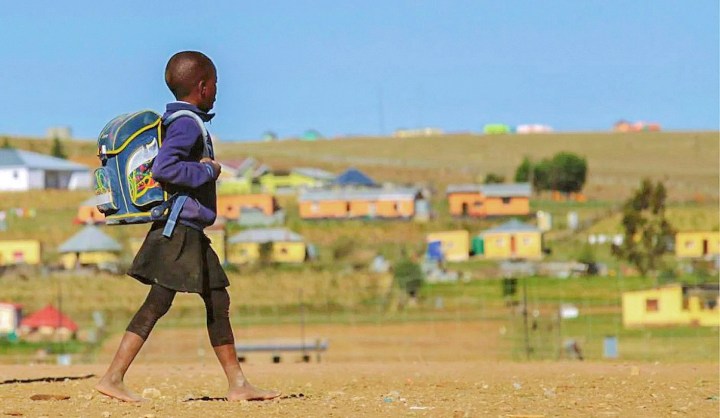LEARNING CURVES
Not all school governing bodies are created equal and schools suffer

Power struggles, corruption and poor record-keeping are just some of the challenges facing school governing bodies, but where they work well, staff and pupils thrive.
More than 24,000 public schools in South Africa voted in their school governing bodies (SGBs) last month. The schools are led by these bodies, functional or dysfunctional.
Experts urged schools to elect representatives who would propel teaching and learning forward to improve the lives of pupils. At the same time, South African public school education laws are being reviewed through the Basic Education Laws Amendment (Bela) bill.
The National Council of Provinces (NCOP) select committee on education and technology, sports, arts and culture adopted the law on 27 March. The majority of votes from provincial legislatures were in favour of the bill after public hearings were held by provincial portfolio committees on education. Only the Western Cape did not accept it.
The committee will now examine clauses to confirm amendments, forward the bill to the NCOP to pass and then to President Cyril Ramaphosa to sign into law.
Bela will detail, among other things, who will have the final say between SGBs and education authorities on matters such as language and admission policies at schools.
Daily Maverick spent weeks investigating issues affecting SGBs and the management of South African public schools.
Education ecosystem
The Department of Basic Education states in its 2018 Strategy to Improve School and Governance, the latest report accessible on SGB matters, that effective school management is universally accepted as being the critical element in the success of schools.
“Many South African schools are struggling to meet their own, community and department criteria for success,” the report reads. This is usually related to the capacity, competency and nature of the school’s management team, particularly the principal.
The department identified a need to formulate strategies as a response to the challenges faced by schools to create a conducive environment for teaching. It reads:
These strategies are meant to support the Action Plan to 2019: Towards the Realisation of Schooling 2025, which contains commitments made in the education sector plan.
School management has been highlighted as a crucial aspect that can improve the performance of schools by the National Development Plan, the country’s blueprint setting out government targets to be met by 2030, according to the report.
The Office of the Auditor-General, it says, also found that the functionality of SGBs to ensure oversight and monitoring of school performance was not executed effectively and efficiently because, in some schools: meeting minutes were not available; meetings were not held quarterly as required by the South African Schools Act; and there were no attendance registers and agendas to confirm there was a quorum.
“Schools did not have updated asset management registers and the process of disposing assets was not properly understood,” the report reads.
Monitoring curriculum and content coverage was not consistently implemented, and managing staff attendance and leave was also not consistent.
SGB impact
Education activist Hendrick Makaneta told Daily Maverick that a functioning SGB is made up of individuals who have the best interests of pupils at heart.
“These are parents and teachers who are driven by the desire to see progress of learners at school,” Makaneta said.
Such an SGB is guided by relevant policies, which are enforced in the school without fear or favour. “The impact of an SGB can be seen on the conduct of learners, teachers and the principal.”
A functioning SGB, according to Makaneta, creates a conducive environment for learning and teaching in which teachers complete the curriculum on time and learners are obedient. They do not compromise on discipline. Learning and teaching is often disrupted by ill discipline among learners in schools with dysfunctional SGBs.
“People who have integrity should be elected to SGBs. SGBs should be led by individuals who are able to at least familiarise themselves with relevant legislation and policies for schools.”
SGB challenges
Makaneta said the biggest challenge faced by most SGBs is the mismanagement of funds meant for school development. There is a correlation between poorly resourced schools and mismanagement.
Sometimes, he said, parents serving on the SGBs in poor schools are unemployed and principals often manipulate them.
Parents, he said, often struggle to make inputs on key matters and leave decisions to the principal because they trust that this person as well as the teachers know what they are doing.
‘Complexities’
Faranaaz Veriava, the head of education at civil society organisation SECTION27, said the issue of functional and dysfunctional SGBs is complex.
Many parents in schools in historically disadvantaged areas are not professionals and therefore do not have accounting skills and access to computers to draw up agendas. She said these parents often cannot attend SGB meetings.
In contrast, “in the historically former Model C schools [fee-paying schools usually in urban areas] you have a lot of professionals. Those people will have a lot of skills and are able to participate more effectively.”
Corruption is another issue, as are the power dynamics between the principal and SGBs, she said. Bela is trying to close opportunities for corruption in schools.
“I think training of SGBs is very important. They perform a very important function,” she said.
Fee-paying school’s functioning SGB
Parktown High School for Girls in Johannesburg is a fee-paying school that has a functional SGB. It has more than 1,000 learners and prides itself on providing a holistic education.
SGB chairperson Imraan Osman, who was re-elected to serve in the body for a second term, said the school is extremely dependent on fee income to appoint additional teachers and provide for its extensive extramural programme.
Success in any organisation, he said, is premised on sound policies, procedures, financial discipline, detailed planning and efficient execution.
The role of a chairperson in any organisation, Osman said, is first to set and maintain its culture with a strong focus on leadership and governance, both procedural and financial. At schools, key to this is having the right people on the SGB – people who are committed, passionate about education and have a skill set that can enhance the schools’ value proposition.
Osman said Parktown High School for Girls is extremely fortunate to have active parent participation in elections and, more importantly, to be able to secure skilled professionals for the SGB.
Given that there is no vested interest other than to give selflessly to ensure the continuing success of the 100-year-old school, the SGB is completely functional and its members have a healthy working relationship. However, Osman singled out cash management as the single largest challenge for any institution and said the school is no different.
“With mounting financial pressures, rising cost of living and increased unemployment, fee collection remains a challenge.”
The school can only offer the heightened value proposition it does if fees are collected.
Clear roles and responsibilities
Osman said it is of the utmost importance to have a healthy and constructive working relationship among all stakeholders. To achieve this, clear roles and responsibilities need to be set and understood.
At the school, the role of the SGB is well understood and management has a clear understanding of their responsibility and the support at their disposal in the form of the body.
The body is not tasked with management, but instead was established to provide leadership support and guidance, governance and financial oversight to the management of the school in discharging their duties.
Osman said SGB members volunteer their time and skills.
Newly elected SGBs “should take the time to understand the fundamentals of the school, how risks have been and are being managed, and what is the journey of continuous improvement”.
Serving on an SGB, he said, is done with the sole purpose of seeking to add value and support to a school in its journey of stability, sustainability and continuous improvement.
“A quality primary and secondary education should not be a privilege but instead a right, and members seeking to serve on SGBs should see their role as ensuring every child receives that right.”
Osman added: “They say that it takes a village to raise a child, and my advice to members of the SGB is to be deliberate and purposeful in being part of that village. The school management cannot do it alone and a sound, committed, skilled and compassionate SGB makes a significant difference to the success of any school.”
No-fee school’s functioning SGB
For Klipspruit-Wes Secondary School SGB secretary Lynette du Plessis, parental involvement has been the major force behind improving teaching and learning in the past two years and maintaining its 50% matric pass rate since 2021, when Du Plessis became the secretary.
The school, in Klipspruit West township, Gauteng, had not been able to consistently achieve a 50% pass rate for more than five years before Du Plessis’s tenure.
Under the present SGB, the pass rate only dropped last year because of what the school described as the calibre of the learners, who had been affected by Covid-19 and could not comply with some of the government interventions put in place, such as the Secondary Schools Improvement Programme.
This programme was launched by then Gauteng education MEC Barbara Creecy in 2013. It is meant, in part, to help Grade 12 learners to attend extra classes and camps.
In the past two years, Du Plessis said, the SGB has been working closely with teachers and learners to find out their needs, including helping the kids with meals in addition to the government’s school feeding scheme.
Part of the SGB’s contribution was to hire teachers with special expertise in certain subjects to come to the school for a day. The SGB also asked professionals who had matriculated from the school to give motivational talks.
‘Troublemakers’
A lack of discipline among learners is a challenge, which is a spillover from the community. Du Plessis said the SGB took a resolution to have a member on the school premises to deal with criminal elements, which are mostly disputes over cellphones and drug-related matters.
The school stopped holding Fun Days because some learners would bring liquor, drugs and weapons to school premises.
“We are raising angels until the door. From the door, you don’t know what your child is up to,” she said.
The school receives learners from five feeder primary schools in Naledi in Soweto, as well as from Lenasia. Du Plessis said they have appealed to parents from these communities to be involved in their children’s education.
There is a need for SGBs to meet and share ideas, she said. This could result in a greater impact and deal with ill discipline in schools. It helped the school after its SGB met with local primary schools last year to identify troublemakers and they planned together how to deal with them.
The meetings also helped in dealing with the needs of learners going into Grade 8 at the school who are known to have difficulties in reading and writing.
Such meetings, she said, help those learners who do not have parents and need food at home. The school also has a garden where the community is allowed to plant vegetables, sell them and share the produce among the residents.
Fee-paying school’s dysfunctional SGB
The KwaZulu-Natal department of education conducted a forensic investigation at Pinetown Girls’ High – a fee-paying school – after allegations received by members of the provincial legislature relating to irregularities in the appointment of service providers to renovate the school.
The investigation resulted in an interim report, which found, among other things, evidence that: the SGB chairperson colluded with some SGB members to solicit funds; the school did not follow transparent procurement processes or competitive bidding processes; there was no proof that work was rendered by the appointed service providers; and SGB members committed gross misconduct for appointing service providers owned by their friends, families or acquaintances.
The interim report recommended disciplinary action, criminal charges and civil claims against the SGB members to recover the funds.
The school referred questions to the department. KwaZulu-Natal education department spokesperson Muzi Mahlambi did not respond to questions.
No-fee school’s dysfunctional SGB
Mpumalanga education authorities said in December there would be an investigation into allegations that Inkunzi Senior Secondary School, a no-fee school in Numbi near Hazyview, forced parents to pay R50 each before their children were given their reports.
At the time, Mpumalanga education department spokesperson Jasper Zwane reportedly stated that the school should never charge parents any amount or withhold learner reports.
SGB chair Joseph Mokoena confirmed in a media report that it was agreed at several meetings that learners should pay the R50.
In a media report, principal Bongani Marule said parents who relied on social grants were allowed to fill in forms confirming they couldn’t afford to pay the R50.
Zwane was approached for comment, but did not respond to questions.
SGB elections
Dr Anthea Cereseto, national CEO of the Governing Body Foundation, said there are no new regulations in some provinces. She said there is a big problem with some school meetings reaching the 15% quorum required for elections.
Other challenges, she said, include people who are not biological or adoptive parents claiming to be parents because they pay the learners’ fees.
“They want to be elected for the advantages they think they will get,” Cereseto said.
Some people still think being on an SGB is a paying job. “We need to emphasise that SGB members render voluntary, unpaid services to the school in the best interests of the school and learners, and not for self-enrichment or to add to a CV or gain a foothold for a political party.”
Federation of School Governing Bodies CEO Jaco Deacon said it is good to see schools running better awareness campaigns.
Ultimately, he said, the federation would like to see regulations that make it possible to get maximum participation to get the best possible candidates to serve on SGBs.
Cereseto said the Governing Body Foundation had presented its response to Bela to the portfolio committee on basic education in November 2022. It was unhappy about certain aspects of powers being taken away. “We know why it has been done,” she said – some SGBs had not conducted their functions fairly. “The real problem is that there are not enough schools providing quality education with all the frills that parents want. The education in fee-paying schools is expensive and the no-fee schools are not funded to the extent that they can [have] all the things that fee-paying schools do.”
She said the language policy is a big issue. “Only Afrikaans-speaking people have schools with their one language. Pressure has been placed on them to change their language policy and offer two languages of learning and teaching.”
About SGBs
Start and administer school funds.
Open and maintain a bank account for the school.
Prepare an annual budget and submit it to parents for approval.
Draw up and submit audited or examined financial statements to their provincial education departments.
Buy textbooks, education material or equipment for the school.
Pay for services.
Supplement funds supplied by provincial education departments (for fee-paying schools) by setting, collecting and administering school fees and other fundraising efforts.
Decide on applications for exemptions (no-fee schools) from school fees.
About principals
Support and guide school expenditure in consultation with the SGB.
Help the SGB keep proper records of school accounts.
Oversee the drawing up of the budget.
Advise on textbooks, educational materials and equipment to be bought and manage their use.
Ensure controls are in place.
Monitor compliance.
Procurement in no-fee schools
Depending on the amount determined by provincial education departments, these schools need to provide the department with three separate quotations from registered suppliers.
Provincial education departments then approve the most suitable quotations by either paying the supplier or transferring funds into the school’s account to pay the supplier.
Also advertise the tender in the government tender bulletin.
Procurement in fee-paying schools
Manage own finances through SGBs.
Are expected to get at least three quotes when making purchases or publish a tender.
Assets need to be registered and accounted for in the audited statements submitted to parents and provincial education departments annually.
Corruption in schools
Includes theft or abuse of school funds and assets.
Entails maladministration or financial misconduct that relates to school resources.
Involves irregular employment practices by principals and/or SGBs.
Irregular procurement practices by principals and/or SGBs.
Report to the SGB.
The SGB then reports to the principal.
The principal reports to the district education office.
The district reports to the head of department.
If findings are not satisfactory, appeal to the education MEC.
If the principal is involved, report to the SGB (and vice versa). DM
Source: Corruption Watch
This story first appeared in our weekly Daily Maverick 168 newspaper, which is available countrywide for R35.



















 Become an Insider
Become an Insider
Comments - Please login in order to comment.